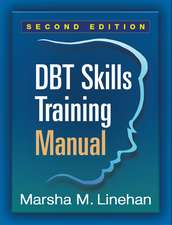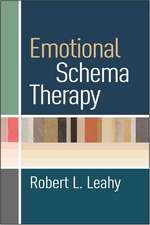Adapting Cognitive Therapy for Depression: Managing Complexity and Comorbidity
Editat de Mark A. Whismanen Limba Engleză Hardback – 26 mar 2008
While the efficacy of cognitive therapy for depression is well established, every clinician is likely to encounter patients who do not respond to standard protocols. In this highly practical volume, leading authorities provide a unified set of clinical guidelines for conceptualizing, assessing, and treating challenging presentations of depression. Presented are detailed, flexible strategies for addressing severe, chronic, partially remitted, or recurrent depression, as well as psychiatric comorbidities, medical conditions, and family problems that may complicate treatment. The book also offers essential knowledge and tools for delivering competent care to specific populations of depressed patients: ethnic minorities; lesbian, gay, and bisexual people; adolescents; and older adults.
Preț: 446.69 lei
Preț vechi: 470.20 lei
-5% Nou
Puncte Express: 670
Preț estimativ în valută:
85.47€ • 89.48$ • 70.72£
85.47€ • 89.48$ • 70.72£
Carte tipărită la comandă
Livrare economică 07-21 aprilie
Preluare comenzi: 021 569.72.76
Specificații
ISBN-13: 9781593856380
ISBN-10: 1593856385
Pagini: 448
Dimensiuni: 152 x 229 x 34 mm
Greutate: 0.88 kg
Ediția:1
Editura: Guilford Publications
Colecția Guilford Press
ISBN-10: 1593856385
Pagini: 448
Dimensiuni: 152 x 229 x 34 mm
Greutate: 0.88 kg
Ediția:1
Editura: Guilford Publications
Colecția Guilford Press
Public țintă
Professional Practice & DevelopmentCuprins
I. Foundations of Cognitive Therapy for Depression
1. Cognitive Therapy for Depression, Keith S. Dobson
2. Initial Assessment, Case Conceptualization, and Treatment Planning, Mark A. Whisman and Lauren M. Weinstock
II. Cognitive Therapy for Complex Depression
3. Severe Depression, Sona Dimidjian, Christopher R. Martell, Sandra J. Coffman, and Steven D. Hollon,
4. Chronic Depression, Anne Garland and Jan Scott
5. Drug-Resistant and Partially Remitted Depression, Giovanni A. Fava and Stefania Fabbri
6. Preventing Recurrent Depression, Robin B. Jarrett, Jeffrey R. Vittengl, and Lee Anna Clark
III. Cognitive Therapy for Comorbid Depression
7. Suicide, Marjan Ghahramanlou-Holloway, Gregory K. Brown, and Aaron T. Beck
8. Panic Disorder and Social Phobia, Michael W. Otto, Mark B. Powers, Georgia Stathopoulou, and Stefan G. Hofmann
9: Generalized Anxiety Disorder, Obsessive–Compulsive Disorder, and Posttraumatic Stress Disorder, Alisa R. Singer, Keith S. Dobson, and David J. A. Dozois
10. Substance Use Disorders, Cory F. Newman
11. Personality Disorders, Arthur Freeman and Gwen E. Rock
12. Borderline Personality Disorder, Clive J. Robins, C. Virginia Fenwick, Jacqueline E. Donnelly, and Jennie Lacy
13. Medical Conditions, Kenneth E. Freedland, Robert M. Carney, and Judith A. Skala
14. Family or Relationship Problems, Lisa A. Uebelacker, Marjorie E. Weishaar, and Ivan W. Miller
IV. Cognitive Therapy for Depression with Special Populations
15: Ethnic Minorities, Laura Kohn-Wood, Glenetta Hudson, and Erin T. Graham
16. Lesbian, Gay, and Bisexual Women and Men, Christopher R. Martell
17. Adolescents, Mark A. Reinecke and John F. Curry
18. Older Adults, Patricia A. Areán and Leilani Feliciano
1. Cognitive Therapy for Depression, Keith S. Dobson
2. Initial Assessment, Case Conceptualization, and Treatment Planning, Mark A. Whisman and Lauren M. Weinstock
II. Cognitive Therapy for Complex Depression
3. Severe Depression, Sona Dimidjian, Christopher R. Martell, Sandra J. Coffman, and Steven D. Hollon,
4. Chronic Depression, Anne Garland and Jan Scott
5. Drug-Resistant and Partially Remitted Depression, Giovanni A. Fava and Stefania Fabbri
6. Preventing Recurrent Depression, Robin B. Jarrett, Jeffrey R. Vittengl, and Lee Anna Clark
III. Cognitive Therapy for Comorbid Depression
7. Suicide, Marjan Ghahramanlou-Holloway, Gregory K. Brown, and Aaron T. Beck
8. Panic Disorder and Social Phobia, Michael W. Otto, Mark B. Powers, Georgia Stathopoulou, and Stefan G. Hofmann
9: Generalized Anxiety Disorder, Obsessive–Compulsive Disorder, and Posttraumatic Stress Disorder, Alisa R. Singer, Keith S. Dobson, and David J. A. Dozois
10. Substance Use Disorders, Cory F. Newman
11. Personality Disorders, Arthur Freeman and Gwen E. Rock
12. Borderline Personality Disorder, Clive J. Robins, C. Virginia Fenwick, Jacqueline E. Donnelly, and Jennie Lacy
13. Medical Conditions, Kenneth E. Freedland, Robert M. Carney, and Judith A. Skala
14. Family or Relationship Problems, Lisa A. Uebelacker, Marjorie E. Weishaar, and Ivan W. Miller
IV. Cognitive Therapy for Depression with Special Populations
15: Ethnic Minorities, Laura Kohn-Wood, Glenetta Hudson, and Erin T. Graham
16. Lesbian, Gay, and Bisexual Women and Men, Christopher R. Martell
17. Adolescents, Mark A. Reinecke and John F. Curry
18. Older Adults, Patricia A. Areán and Leilani Feliciano
Notă biografică
Mark A. Whisman, PhD, is Professor of Psychology and Director of Clinical Training at the University of Colorado at Boulder. He is a Founding Fellow of the Academy of Cognitive and Behavioral Therapies and a former Van Ameringen Scholar at the Beck Institute for Cognitive Therapy and Research. A major focus of Dr. Whisman's research has been cognitive models of depression, and the predictors and processes of change in cognitive therapy of depression. He has published over 80 journal articles and book chapters and has coedited one book (with Douglas K. Snyder, Treating Difficult Couples: Helping Clients with Coexisting Mental and Relationship Disorders). His research has been funded by the National Institute of Mental Health and by the National Alliance for Research on Schizophrenia and Depression. Dr. Whisman was formerly Associate Editor of Contemporary Psychology and has served on the editorial boards of Journal of Consulting and Clinical Psychology, Journal of Family Psychology, Clinical Psychology: Science and Practice, Behavior Therapy, and Applied and Preventive Psychology.
Recenzii
"This volume focuses on key, increasingly acknowledged challenges in treating depression. The coverage is thorough and comprehensive, with chapters on a wide range of difficult-to-treat forms of depression, comorbid disorders, and special populations, all written by leading researchers in the field. A particular strength of each chapter is a detailed and fully-worked-through case example, plus a brief review of the empirical evidence. This is an excellent resource for therapists working with depressed clients."--Edward R. Watkins, PhD, Mood Disorders Centre, School of Psychology, University of Exeter, United Kingdom
"This book is a major accomplishment in the cognitive therapy field. Whisman's contributors are leading authorities, and the range and scope of the text will make it highly useful for both practitioners and researchers. This is a 'must read' for psychologists, psychiatrists, and social workers who want to review the latest developments in cognitive therapy."--James P. McCullough, Jr., PhD, Distinguished Professor of Psychology and Psychiatry, Virginia Commonwealth University
"This book is a most welcome complement to the many excellent basic guides to the cognitive therapy (CT) of depression. It is an excellent choice for an advanced course in psychotherapy or CT, and it will find a place close at hand on the bookshelves of clinicians who wish to provide CT for depressed clients experiencing a wide range of comorbid disorders and complicating circumstances. Enlisting the efforts of world experts in CT, Whisman delivers an evidence-based, comprehensive toolbox, filled with vivid, edifying case examples and concrete, skill-building practice dialogues."--Robert J. DeRubeis, PhD, Department of Psychology, University of Pennsylvania"This book is a major accomplishment in the cognitive therapy field. Whisman's contributors are leading authorities, and the range and scope of the text will make it highly useful for both practitioners and researchers. This is a 'must read' for psychologists, psychiatrists, and social workers who want to review the latest developments in cognitive therapy."--James P. McCullough, Jr., PhD, Distinguished Professor of Psychology and Psychiatry, Virginia Commonwealth University
This book will be relevant to a wide audience....A helpful feature of the book is the consistent structure of each chapter; assessment and conceptualization, treatment including useful adaptations to standard approach, a case illustration, and finally a review of efficacy research. After Part I, chapters are stand alone, allowing the clinicians to quickly read up on a particular topic....The book offers a good introduction to adapting CT for complex depression.
--Behavioural and Cognitive Psychotherapy, 2/7/2008ƒƒThis book brings together a number of leaders in the field, who provide useful lessons learned from many years of experience in treating depression....The strengths of this book lay not only in the breadth of complexities and comorbidities covered, but also in the common structure across chapters within Parts 2-4, where clinicians are guided through a logical sequence of theory, research, and practical application.
--Drug and Alcohol Review, 2/7/2008ƒƒUseful to therapists irrespective of theoretical orientation....Whisman's treatment of CT includes detailed explanations and case examples of these processes applied to the actual processes of psychotherapy for a wide variety of populations and clinical concerns....Whisman effectively illustrates the breadth and depth of the phenomenon of comorbidity in both conceptual and practical terms. The critical thinking of practitioners and researchers will be stimulated and challenged. Adapting Cognitive Therapy for Depression: Managing Complexity and Comorbidity fulfills its promise by providing conceptual information and case examples illustrating the wide impact of comorbidity on the practice of CT for depression.
--PsycCRITIQUES, 2/7/2008Descriere
While the efficacy of cognitive therapy for depression is well established, every clinician is likely to encounter patients who do not respond to ""standard"" protocols. In this highly practical volume, leading authorities provide a unified set of clinical guidelines for conceptualizing, assessing, and treating challenging presentations of depression. Presented are detailed, flexible strategies for addressing severe, chronic, partially remitted, or recurrent depression, as well as psychiatric comorbidities, medical conditions, and family problems that may complicate treatment. The book also offers essential knowledge and tools for delivering competent care to specific populations of depressed patients: ethnic minorities; lesbian, gay, and bisexual people; adolescents; and older adults.









